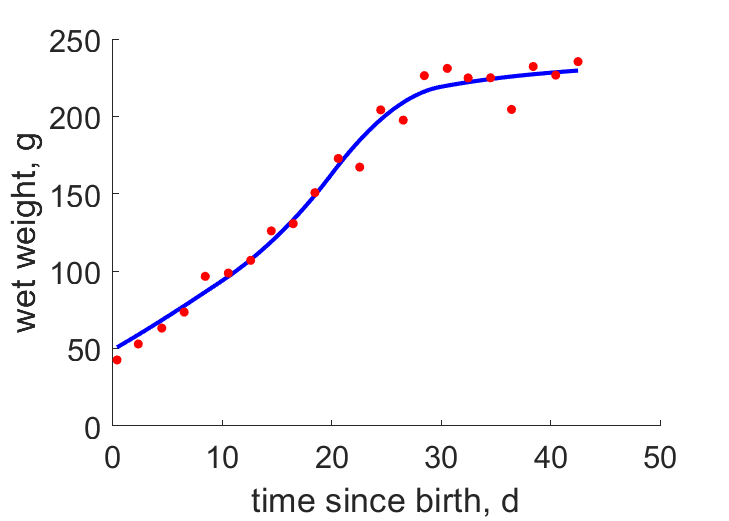Predictions & Data for this entry
| Model: std | climate: MA, MB | migrate: Ms | phylum: |
| COMPLETE = 2.7 | ecozone: MPSE, MI, MASW | food: biCvf | class: |
| MRE = 0.018 | habitat: 0iTht, 0iThh | gender: Dg | order: |
| SMSE = 0.001 | embryo: Tnsfm | reprod: O | family: |
Zero-variate data
| Data | Observed | Predicted | (RE) | Unit | Description | Reference |
|---|---|---|---|---|---|---|
| ab | 27.5 | 27.24 | (0.00929) | d | age at birth | avibase |
| tx | 39 | 38.96 | (0.001015) | d | time since birth at fledging | avibase |
| tp | 117 | 123.4 | (0.05511) | d | time since birth at puberty | guess |
| tR | 730 | 730 | ( 0) | d | time since birth at 1st brood | avibase |
| am | 7424 | 7407 | (0.002311) | d | life span | avibase |
| Ww0 | 60 | 70.44 | (0.1741) | g | intitial wet weight | avibase |
| Wwb | 42.6 | 43.62 | (0.02389) | g | wet weight at birth | LangHuls1986 |
| Wwi | 241.7 | 242.7 | (0.003972) | g | ultimate wet weight | avibase |
| Wwim | 305.7 | 305.2 | (0.001635) | g | ultimate wet weight for males | avibase |
| Ri | 0.00274 | 0.002778 | (0.01392) | #/d | maximum reprod rate | avibase |
Uni- and bivariate data
| Data | Figure | Independent variable | Dependent variable | (RE) | Reference |
|---|---|---|---|---|---|
| tW |  | time since birth | wet weight | (0.04175) | LangHuls1986 |
Pseudo-data at Tref = 20°C
| Data | Generalised animal | Thalasseus bergii | Unit | Description |
|---|---|---|---|---|
| v | 0.02 | 0.04618 | cm/d | energy conductance |
| p_M | 18 | 505.7 | J/d.cm^3 | vol-spec som maint |
| k_J | 0.002 | 0.02003 | 1/d | maturity maint rate coefficient |
| k | 0.3 | 0.2904 | - | maintenance ratio |
| kap | 0.8 | 0.745 | - | allocation fraction to soma |
| kap_G | 0.8 | 0.7988 | - | growth efficiency |
| kap_R | 0.95 | 0.95 | - | reproduction efficiency |
Discussion
- Males are assumed to differ from females by {p_Am} only
- mod_1: Pseudo-data point k is used, rather than k_J; Data set tp and parameter t_R are added, the latter replacing clutch interval t_N. Postnatal T is based on PrinPres1991, see get_T_Aves. See further the revision page, theme puberty
Bibliography